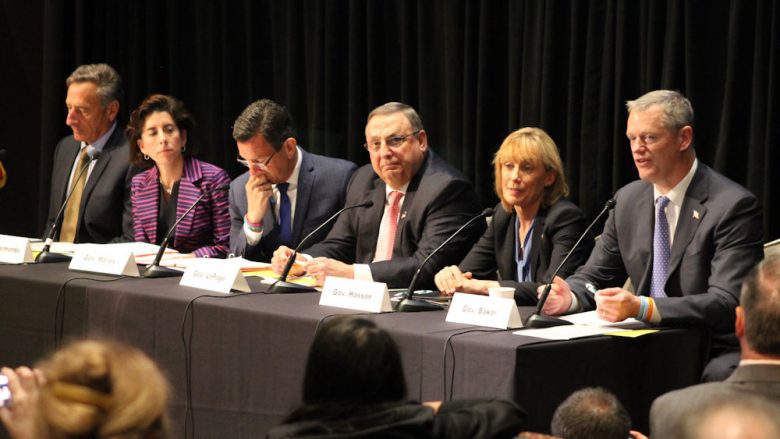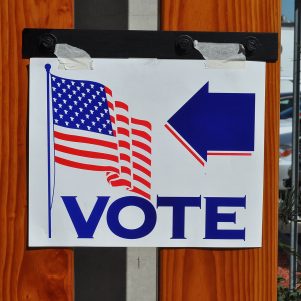Opioid overdose epidemic comes into focus for NE governors
By State House News Service | June 7, 2016, 14:44 EDT
 Massachusetts Gov. Charlie Baker, right, speaks during a panel discussion of the opioid overdose epidemic gripping the region. (State House News Service photo by Antonio Caban)
Massachusetts Gov. Charlie Baker, right, speaks during a panel discussion of the opioid overdose epidemic gripping the region. (State House News Service photo by Antonio Caban) BOSTON – Sharing a table at Harvard Medical School in Boston, New England’s six governors pledged Tuesday to crack down on drug trafficking and share data from state prescription-monitoring programs.
Levels of optimism varied among the four Democrats and two Republicans on the panel, as did the finger of blame, shifting alternately between illegal drug dealers, the pharmaceutical industry and federal drug regulators.
Maine Gov. Paul LePage, a Republican, predicted 90 percent of today’s addicts will be dead by the time officials get a handle on the public-health crisis involving opiates and synthetic pain killers, though he said doctors in his state “get it” and the amount of opioid prescriptions they’ve been writing has gone down.
“One physician told me recently that we’re going to lose a generation,” LePage said. “By 2022 is when we’re going to get control of this disease, they’re predicting. And 90 percent that are addicted today will be dead.”
Connecticut Gov. Dan Malloy said the introduction of fentanyl, an extremely potent opioid, or synthetic opiate, that has been blamed for a growing number of overdose deaths, guarantees that heroin will remain cheap. People who become addicted to painkillers like oxycodone sometimes turn to heroin because it can be easier to get on the street.
“Four years ago none of the New England states and New York were universally sharing that data within the geography – none,” said Malloy, who said Connecticut had 16 partnering states on sharing prescription data, but none in New England. He said, “We were very hung up about personal rights and not sharing information, and protocol, and not overly burdening doctors and pharmacies to the extent that we could not even enter into agreements within the region. Hopefully that’s over and a number of us are now sharing that data.”
New Hampshire Gov. Maggie Hassan said the Granite State is working to improve prescription monitoring. LePage said his state made monitoring mandatory and Gov. Charlie Baker said governors are working to make the systems “all interoperable.”
Baker also said the public would “see a significant amount of effort” between the New England states on curbing drug trafficking.
Placing much of the blame on the pharmaceutical industry, Vermont Gov. Pete Shumlin, a Democrat, said strides could be made by returning to “the prescribing practices pre-Oxycontin,” referring to another opioid painkiller.
“The facts are we’re passing out Oxycontin like candy. That leads to addiction,” Shumlin said. “This challenge was brought to us by big pharma and the FDA, which is true. The FDA is not partnering with us to solve this problem. In fact I would argue they are our problem.”
LePage, who opposes easy access to the overdose-reversing drug Naloxone, differs from the other New England governors on that issue. Massachusetts Gov. Charlie Baker, the only other Republican on the panel, said opioid-related deaths would’ve been nearly five times greater in the Bay State without easy access to the medication, while Shumlin boasted of its availability in Vermont.
“We’re passing out Naloxone now like some physicians pass out Oxycontin,” Shumlin said. “You can get it with your Band-Aids and your Q-tips.”
Massachusetts “lost 1,500 people in Massachusetts in 2015,” said Baker, who speculated the death toll “without Narcan would have been north of 5,000.”
LePage did not criticize access to Naloxone, which goes by the brand name Narcan, but in April he vetoed a bill – later overridden by legislators – seeking to expand access to the drug in Maine.
“Naloxone does not truly save lives; it merely extends them until the next overdose,” LePage wrote in his veto message. “Creating a situation where an addict has a heroin needle in one hand and a shot of naloxone in the other produces a sense of normalcy and security around heroin use that serves only to perpetuate the cycle of addiction.”
Baker described the frustration he felt after being approached about the addiction crisis throughout his campaign by people outside the medical profession but having to prompt the medical community to hear about the issue.
“You need to speak up,” Baker said, echoing a message he said he delivered to UMass Medical School graduates. Baker also touted new addiction training requirements he signed into law for doctors.
Baker, who has made opioid addiction a prime focus of his administration, is hardly alone in devoting energy to the problem. Shumlin dedicated his state of the state address to the topic in 2014 and Baker’s predecessor Deval Patrick tangled in federal court with the makers of the painkiller Zohydro that same year.
Hassan, who is running for U.S. Senate, sought to balance discussion of the ill effect of painkillers with their positive use for people with long-term conditions.
“I understand well the value of opioids for treating chronic pain,” said Hassan.
Written by Andy Metzger
NBPHealth











